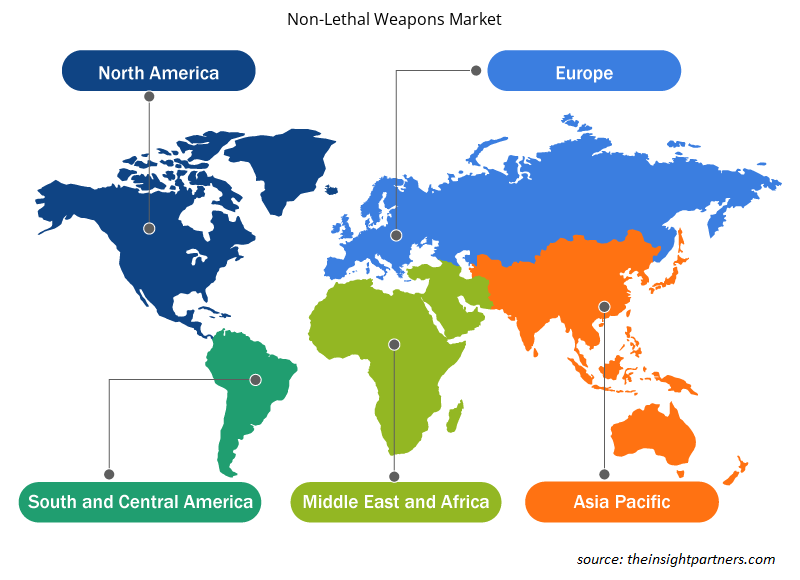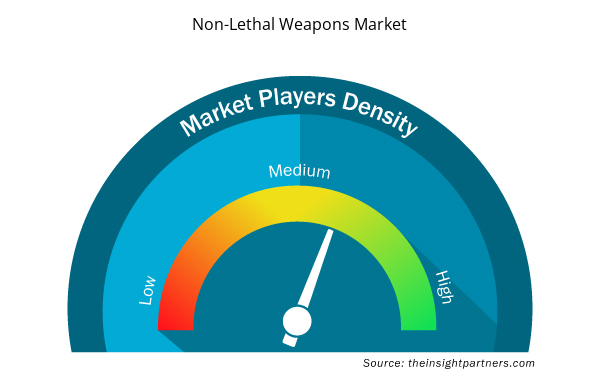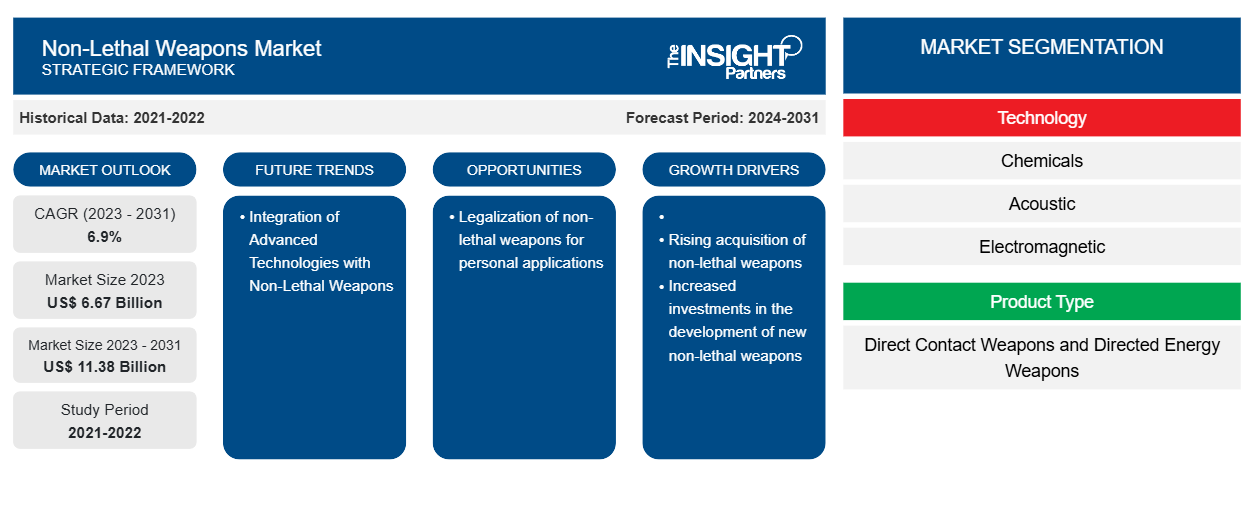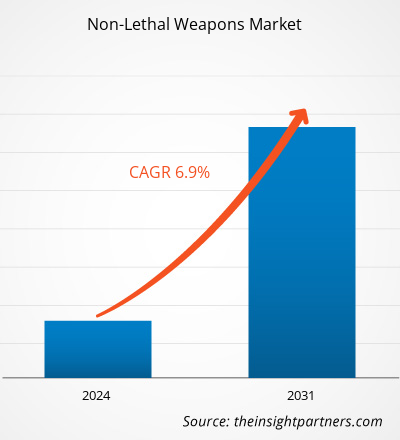Der Markt für nichttödliche Waffen soll von 6,67 Milliarden US-Dollar im Jahr 2023 auf 11,38 Milliarden US-Dollar im Jahr 2031 anwachsen. Für den Zeitraum 2023–2031 wird ein durchschnittliches jährliches Wachstum von 6,9 % erwartet. Die Integration fortschrittlicher Technologien in nichttödliche Waffen dürfte ein wichtiger Trend auf dem Markt bleiben.
Marktanalyse für nichttödliche Waffen
Geringe Produktdifferenzierung für bestimmte Produktkategorien wie Taser, Schlagstöcke und Pfeffersprays, die zu den am häufigsten verwendeten nichttödlichen Waffen unter den Endverbrauchern gehören. Darüber hinaus haben strenge Vorschriften für den Einsatz nichttödlicher Waffen für zivile Zwecke unter bestimmten Umständen auch zu einer Zurückhaltung bei den Privatnutzern geführt. Solche Faktoren haben den Markt in mehreren Segmenten beeinflusst.
Marktübersicht für nichttödliche Waffen
Zunehmende soziale Unruhen und die Militarisierung der Strafverfolgungsbehörden sind die Hauptfaktoren, die das Wachstum des Marktes für nichttödliche Waffen unterstützen. Strenge Umwelt- und Regierungsvorschriften in einigen Entwicklungsländern schränken jedoch das Wachstum des Marktes für nichttödliche Waffen ein.
Darüber hinaus treiben die steigenden Kriminalitätsraten und Aufstände in mehreren Ländern wie den USA, Israel und anderen Ländern die Entwicklung des Marktes für nichttödliche Waffen in verschiedenen Regionen voran.
Passen Sie diesen Bericht Ihren Anforderungen an
Sie erhalten kostenlose Anpassungen an jedem Bericht, einschließlich Teilen dieses Berichts oder einer Analyse auf Länderebene, eines Excel-Datenpakets sowie tolle Angebote und Rabatte für Start-ups und Universitäten.
- Holen Sie sich die wichtigsten Markttrends aus diesem Bericht.Dieses KOSTENLOSE Beispiel umfasst eine Datenanalyse von Markttrends bis hin zu Schätzungen und Prognosen.
Treiber und Chancen auf dem Markt für nichttödliche Waffen
Erhöhte Investitionen in die Entwicklung neuer nichttödlicher Waffen
Die zunehmende Instabilität in verschiedenen Regionen aufgrund verschiedener umstrittener Gesetze und Vorschriften, die von mehreren Regierungen erlassen wurden, hat den Bedarf an Waffen mit einem geringen Risiko von Opfern erhöht. Menschenrechtsgesetzgeber und Regierungen haben Vorschriften erlassen, die mehrere Sicherheits- und Verteidigungsorganisationen dazu verpflichten, Waffen zu erwerben, die ein geringeres Risiko darstellen, einen Verdächtigen zu töten. Dieser Anstieg der Nachfrage nach weniger tödlichen Waffen hat die Entwicklung neuer und fortschrittlicher nichttödlicher Waffen gefördert. Einige große Akteure auf dem globalen Markt für nichttödliche Waffen sind FN HERSTAL, Lamperd Less Lethal, Combined Systems, Inc., Pepperball und Rheinmetall AG.
Integration fortschrittlicher Technologien in nichttödliche Waffen
Nichttödliche Waffen erfreuen sich aufgrund ihrer fortschrittlichen Funktionen und ihrer Fähigkeit, Unruhen zu beruhigen, ohne Opfer zu fordern, zunehmender Beliebtheit. Rüstungsunternehmen und wichtige Marktteilnehmer haben ihre Produktportfolios mit fortschrittlichen Technologien erweitert, darunter Laser-Abwehrsysteme, akustische Langstreckengeräte, verbesserte Unterwasser-Megaphone, Blendgranaten, akustische Megaphone, modulare Waffen zur Kontrolle von Menschenmengen und Taser . Diese Technologieintegrationen in nichttödliche Waffen treiben das Wachstum des Marktes für nichttödliche Waffen voran.
Segmentierungsanalyse des Marktberichts zu nichttödlichen Waffen
Schlüsselsegmente, die zur Ableitung der Marktanalyse für nichttödliche Waffen beigetragen haben, sind Technologie, Produkttyp und Anwendung.
- Basierend auf der Technologie ist der Markt für nichttödliche Waffen in chemische, akustische, elektromagnetische sowie mechanische und kinetische Waffen unterteilt. Das mechanische und kinetische Segment hatte im Jahr 2023 einen größeren Marktanteil.
- Basierend auf dem Produkttyp ist der Markt für nichttödliche Waffen in Direktkontaktwaffen und Energiewaffen unterteilt. Das Segment der Direktkontaktwaffen hatte im Jahr 2023 einen größeren Marktanteil.
- Nach Anwendung ist der Markt in Strafverfolgungsbehörden , Militär und personalisierte Anwendungen unterteilt. Die Strafverfolgungsbehörden hielten im Jahr 2023 den größten Marktanteil.
Nichttödliche Waffen – Marktanteilsanalyse nach geografischer Lage
Der geografische Umfang des Marktberichts für nichttödliche Waffen ist hauptsächlich in fünf Regionen unterteilt: Nordamerika, Europa, Asien-Pazifik, Naher Osten und Afrika sowie Südamerika.
Nordamerika dominierte den Markt im Jahr 2023, gefolgt von Europa und dem asiatisch-pazifischen Raum. Darüber hinaus dürfte der asiatisch-pazifische Raum in den kommenden Jahren die höchste durchschnittliche jährliche Wachstumsrate verzeichnen. Die steigenden Investitionen regionaler Akteure in die Entwicklung fortschrittlicher nichttödlicher Waffen dürften ebenfalls das Wachstum des Marktes für nichttödliche Waffen vorantreiben. So entwickelte beispielsweise ein in Uttar Pradesh ansässiges indisches Unternehmen nichttödliche Waffen wie Varja und Trishul, um seine Streitkräfte nach dem Zusammenstoß im Galwan-Tal vor plötzlichen Angriffen zu schützen. Somit kurbeln diese oben genannten Faktoren das Wachstum des Marktes für nichttödliche Waffen im asiatisch-pazifischen Raum an.
Regionale Einblicke in den Markt für nichttödliche Waffen
Die regionalen Trends und Faktoren, die den Markt für nichttödliche Waffen im Prognosezeitraum beeinflussen, wurden von den Analysten von Insight Partners ausführlich erläutert. In diesem Abschnitt werden auch Marktsegmente und Geografie für nichttödliche Waffen in Nordamerika, Europa, im asiatisch-pazifischen Raum, im Nahen Osten und Afrika sowie in Süd- und Mittelamerika erörtert.

- Erhalten Sie regionale Daten zum Markt für nichttödliche Waffen
Umfang des Marktberichts zu nichttödlichen Waffen
| Berichtsattribut | Details |
|---|---|
| Marktgröße im Jahr 2023 | 6,67 Milliarden US-Dollar |
| Marktgröße bis 2031 | 11,38 Milliarden US-Dollar |
| Globale CAGR (2023 - 2031) | 6,9 % |
| Historische Daten | 2021-2022 |
| Prognosezeitraum | 2024–2031 |
| Abgedeckte Segmente | Nach Technologie
|
| Abgedeckte Regionen und Länder | Nordamerika
|
| Marktführer und wichtige Unternehmensprofile |
|
Marktteilnehmerdichte für nichttödliche Waffen: Auswirkungen auf die Geschäftsdynamik verstehen
Der Markt für nichttödliche Waffen wächst rasant, angetrieben von der steigenden Nachfrage der Endnutzer aufgrund von Faktoren wie sich entwickelnden Verbraucherpräferenzen, technologischen Fortschritten und einem größeren Bewusstsein für die Vorteile des Produkts. Mit der steigenden Nachfrage erweitern Unternehmen ihr Angebot, entwickeln Innovationen, um die Bedürfnisse der Verbraucher zu erfüllen, und nutzen neue Trends, was das Marktwachstum weiter ankurbelt.
Die Marktteilnehmerdichte bezieht sich auf die Verteilung der Firmen oder Unternehmen, die in einem bestimmten Markt oder einer bestimmten Branche tätig sind. Sie gibt an, wie viele Wettbewerber (Marktteilnehmer) in einem bestimmten Marktraum im Verhältnis zu seiner Größe oder seinem gesamten Marktwert präsent sind.
Die wichtigsten auf dem Markt für nichttödliche Waffen tätigen Unternehmen sind:
- BAE Systems
- Kombinierte Systeme, Inc.
- Nichttödliche Technologien von Condor
- FN Herstal
- Lamperd, Inc.
Haftungsausschluss : Die oben aufgeführten Unternehmen sind nicht in einer bestimmten Reihenfolge aufgeführt.

- Überblick über die wichtigsten Akteure auf dem Markt für nichttödliche Waffen
Nachrichten und aktuelle Entwicklungen zum Markt für nichttödliche Waffen
Der Markt für nichttödliche Waffen wird durch die Erhebung qualitativer und quantitativer Daten aus Primär- und Sekundärforschung bewertet, die wichtige Unternehmensveröffentlichungen, Verbandsdaten und Datenbanken einschließen. Nachfolgend sind einige der Entwicklungen auf dem Markt für nichttödliche Waffen aufgeführt:
PepperBall, der führende Anbieter innovativer nichttödlicher Lösungen für die Strafverfolgung, ist stolz darauf, die Einführung seiner neu gestalteten TAC-SA-Modelle – TAC-SA PRO und TAC-SA PRO PLUS – auf der diesjährigen SHOT Show am Stand 72205 bekannt zu geben. Diese Werfer repräsentieren die neuesten Fortschritte bei nichttödlichen Reaktionslösungen und sind auf die vielfältigen Bedürfnisse von Strafverfolgungsfachleuten zugeschnitten. (Quelle: PepperBall, Pressemitteilung, Januar 2024)
- PepperBall, ein führender Anbieter nichttödlicher Lösungen für die Strafverfolgung, ist stolz darauf, die Einführung seiner neu gestalteten Werfer FTC PRO und FTC PRO PLUS bekannt zu geben. Diese hochmodernen Modelle werden auf der SHOT Show 2024 vorgestellt. FTC PRO und FTC PRO PLUS sind so konzipiert, dass sie den sich ständig weiterentwickelnden Anforderungen von Strafverfolgungsbeamten gerecht werden. Obwohl beide Werfer eine Reihe innovativer Funktionen gemeinsam haben, verfügt jeder über einzigartige Aspekte, die auf spezifische betriebliche Anforderungen zugeschnitten sind. (Quelle: Lockheed Martin Australia, Pressemitteilung, Januar 2024)
Marktbericht zu nichttödlichen Waffen – Abdeckung und Ergebnisse
Der Bericht „Marktgröße und Prognose für nichttödliche Waffen (2021–2031)“ bietet eine detaillierte Analyse des Marktes, die die folgenden Bereiche abdeckt:
- Marktgröße und Prognose für nichttödliche Waffen auf globaler, regionaler und Länderebene für alle wichtigen Marktsegmente, die im Rahmen des Berichts abgedeckt sind
- Markttrends für nichttödliche Waffen sowie Marktdynamiken wie Treiber, Beschränkungen und wichtige Chancen
- Detaillierte Porter-Fünf-Kräfte-Analyse
- Marktanalyse für nichttödliche Waffen, die wichtige Markttrends, globale und regionale Rahmenbedingungen, wichtige Akteure, Vorschriften und aktuelle Marktentwicklungen umfasst
- Branchenlandschaft und Wettbewerbsanalyse, die die Marktkonzentration, Heatmap-Analyse, prominente Akteure und aktuelle Entwicklungen auf dem Markt für nichttödliche Waffen umfasst
- Detaillierte Firmenprofile
- Historische Analyse (2 Jahre), Basisjahr, Prognose (7 Jahre) mit CAGR
- PEST- und SWOT-Analyse
- Marktgröße Wert/Volumen – Global, Regional, Land
- Branche und Wettbewerbsumfeld
- Excel-Datensatz


- Travel Vaccines Market
- Europe Industrial Chillers Market
- Aerospace Forging Market
- Aircraft Landing Gear Market
- GNSS Chip Market
- Vision Guided Robotics Software Market
- Arterial Blood Gas Kits Market
- Quantitative Structure-Activity Relationship (QSAR) Market
- Cling Films Market
- Hydrolyzed Collagen Market

Report Coverage
Revenue forecast, Company Analysis, Industry landscape, Growth factors, and Trends

Segment Covered
This text is related
to segments covered.

Regional Scope
North America, Europe, Asia Pacific, Middle East & Africa, South & Central America

Country Scope
This text is related
to country scope.
Häufig gestellte Fragen
North America region dominated the non-lethal weapons market in 2023.
Rising acquisition of non-lethal weapons and increased investments in the development of new non-lethal weapons are some of the factors driving the growth for non-lethal weapons market.
Legalization of non-lethal weapons for personal applications is one of the major trends of the market.
FN HERSTAL, Lamperd Less Lethal, Combined Systems Inc, Pepperball, Rheinmetall AG, NonLethal Technologies Inc, Condor Non-Lethal Technologies, Axon Enterprise Inc, ISPRA, and Byrna Technologies Inc are some of the key players profiled under the report.
The estimated value of the non-lethal weapons market by 2031 would be around US$ 11.38 billion.
The non-lethal weapons market is likely to register of 6.9% during 2023-2031.
Trends and growth analysis reports related to Aerospace and Defense : READ MORE..
The Insight Partners performs research in 4 major stages: Data Collection & Secondary Research, Primary Research, Data Analysis and Data Triangulation & Final Review.
- Data Collection and Secondary Research:
As a market research and consulting firm operating from a decade, we have published and advised several client across the globe. First step for any study will start with an assessment of currently available data and insights from existing reports. Further, historical and current market information is collected from Investor Presentations, Annual Reports, SEC Filings, etc., and other information related to company’s performance and market positioning are gathered from Paid Databases (Factiva, Hoovers, and Reuters) and various other publications available in public domain.
Several associations trade associates, technical forums, institutes, societies and organization are accessed to gain technical as well as market related insights through their publications such as research papers, blogs and press releases related to the studies are referred to get cues about the market. Further, white papers, journals, magazines, and other news articles published in last 3 years are scrutinized and analyzed to understand the current market trends.
- Primary Research:
The primarily interview analysis comprise of data obtained from industry participants interview and answers to survey questions gathered by in-house primary team.
For primary research, interviews are conducted with industry experts/CEOs/Marketing Managers/VPs/Subject Matter Experts from both demand and supply side to get a 360-degree view of the market. The primary team conducts several interviews based on the complexity of the markets to understand the various market trends and dynamics which makes research more credible and precise.
A typical research interview fulfils the following functions:
- Provides first-hand information on the market size, market trends, growth trends, competitive landscape, and outlook
- Validates and strengthens in-house secondary research findings
- Develops the analysis team’s expertise and market understanding
Primary research involves email interactions and telephone interviews for each market, category, segment, and sub-segment across geographies. The participants who typically take part in such a process include, but are not limited to:
- Industry participants: VPs, business development managers, market intelligence managers and national sales managers
- Outside experts: Valuation experts, research analysts and key opinion leaders specializing in the electronics and semiconductor industry.
Below is the breakup of our primary respondents by company, designation, and region:

Once we receive the confirmation from primary research sources or primary respondents, we finalize the base year market estimation and forecast the data as per the macroeconomic and microeconomic factors assessed during data collection.
- Data Analysis:
Once data is validated through both secondary as well as primary respondents, we finalize the market estimations by hypothesis formulation and factor analysis at regional and country level.
- Macro-Economic Factor Analysis:
We analyse macroeconomic indicators such the gross domestic product (GDP), increase in the demand for goods and services across industries, technological advancement, regional economic growth, governmental policies, the influence of COVID-19, PEST analysis, and other aspects. This analysis aids in setting benchmarks for various nations/regions and approximating market splits. Additionally, the general trend of the aforementioned components aid in determining the market's development possibilities.
- Country Level Data:
Various factors that are especially aligned to the country are taken into account to determine the market size for a certain area and country, including the presence of vendors, such as headquarters and offices, the country's GDP, demand patterns, and industry growth. To comprehend the market dynamics for the nation, a number of growth variables, inhibitors, application areas, and current market trends are researched. The aforementioned elements aid in determining the country's overall market's growth potential.
- Company Profile:
The “Table of Contents” is formulated by listing and analyzing more than 25 - 30 companies operating in the market ecosystem across geographies. However, we profile only 10 companies as a standard practice in our syndicate reports. These 10 companies comprise leading, emerging, and regional players. Nonetheless, our analysis is not restricted to the 10 listed companies, we also analyze other companies present in the market to develop a holistic view and understand the prevailing trends. The “Company Profiles” section in the report covers key facts, business description, products & services, financial information, SWOT analysis, and key developments. The financial information presented is extracted from the annual reports and official documents of the publicly listed companies. Upon collecting the information for the sections of respective companies, we verify them via various primary sources and then compile the data in respective company profiles. The company level information helps us in deriving the base number as well as in forecasting the market size.
- Developing Base Number:
Aggregation of sales statistics (2020-2022) and macro-economic factor, and other secondary and primary research insights are utilized to arrive at base number and related market shares for 2022. The data gaps are identified in this step and relevant market data is analyzed, collected from paid primary interviews or databases. On finalizing the base year market size, forecasts are developed on the basis of macro-economic, industry and market growth factors and company level analysis.
- Data Triangulation and Final Review:
The market findings and base year market size calculations are validated from supply as well as demand side. Demand side validations are based on macro-economic factor analysis and benchmarks for respective regions and countries. In case of supply side validations, revenues of major companies are estimated (in case not available) based on industry benchmark, approximate number of employees, product portfolio, and primary interviews revenues are gathered. Further revenue from target product/service segment is assessed to avoid overshooting of market statistics. In case of heavy deviations between supply and demand side values, all thes steps are repeated to achieve synchronization.
We follow an iterative model, wherein we share our research findings with Subject Matter Experts (SME’s) and Key Opinion Leaders (KOLs) until consensus view of the market is not formulated – this model negates any drastic deviation in the opinions of experts. Only validated and universally acceptable research findings are quoted in our reports.
We have important check points that we use to validate our research findings – which we call – data triangulation, where we validate the information, we generate from secondary sources with primary interviews and then we re-validate with our internal data bases and Subject matter experts. This comprehensive model enables us to deliver high quality, reliable data in shortest possible time.


 Holen Sie sich ein kostenloses Muster für diesen Bericht
Holen Sie sich ein kostenloses Muster für diesen Bericht